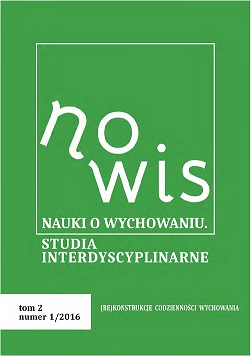The Everyday Reality of Metaphor in the Perspective of Cognitive Science. Attempt of Critical Analysis
Keywords:
metaphor, language, conceptualization, domainAbstract
The aim of the paper is to provide a critical analysis of the basic assumptions of the cognitive theory of metaphor. The first part is devoted to the issues related to the coherence of the concept of metaphorical mapping. The second one discusses the validity of the metaphorization process in terms of schema-concretization framework. Finally, the third part raises the problem of using cognitive metaphor as the primary tool for the conceptualization of the realm of abstract thinking. An additional objective of the text is to display the presence of metaphor in everyday communication processes, conceptualization of common experience and thus also in the scientific and educational practice.
References
Arystoteles (2009) Retoryka. Retoryka dla Aleksandra. Poetyka, przeł. H. Podbielski, Warszawa, Wydawnictwo Naukowe PWN.
Google Scholar
Clausner T., Croft W. (1997) Productivity and schematicity in metaphors, „Cognitive Science”, nr 21/3, s. 247–282.
Google Scholar
Fauconnier G. (1997) Mappings in Thought and Language, Cambridge, Cambridge University Press.
Google Scholar
Gärdenfors P. (2004) Conceptual Spaces: The Geometry of Thought, Cambridge, MIT Press.
Google Scholar
Gärdenfors P. (2014) The Geometry of Meaning: Semantics Based on Conceptual Spaces, Cambridge, MIT Press.
Google Scholar
Gemel A. (2015) Językowy model poznania. Kognitywne komponenty w kontynentalnej filozofii języka, Łódź, Wydawnictwo Uniwersytetu Łódzkiego.
Google Scholar
Lakoff G., Johnson M. (2010) Metafory w naszym życiu, przeł. T. P. Krzeszowski, Warszawa, Aletheia.
Google Scholar
Langacker R. (2009) Gramatyka kognitywna. Wprowadzenie, przeł. E. Tabakowska et al., Kraków, Universitas.
Google Scholar
Markowski M. P. (1996) Nietzsche i hermeneutyka, „Teksty Drugie: Teoria Literatury, Krytyka, Interpretacja”, nr 1/37, s. 20–41.
Google Scholar
Pieniążek P. (2002) Subwersywne poplecznictwo: Foucault/Nietzsche, „Hybris. Internetowy Magazyn Filozoficzny”, nr 2.
Google Scholar
Tyler A., Evans V. (2001) The relations between experience, conceptual structure and meanning: Non-temporal uses of tense and language teaching w: Applied Cognitive Linguistics, vol. 1: Theory and Language Acquisition, M. Pütz, S. Niemeier, R. Dirven (red.), Berlin–New York, Mounton de Gruyter, s. 63–105.
Google Scholar
Downloads
Published
How to Cite
Issue
Section
License

This work is licensed under a Creative Commons Attribution-NonCommercial-NoDerivatives 4.0 International License.

 The journal's website, created and edited by the NOWiS Editorial Team on the Index Copernicus platform:
The journal's website, created and edited by the NOWiS Editorial Team on the Index Copernicus platform: 





